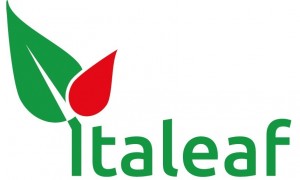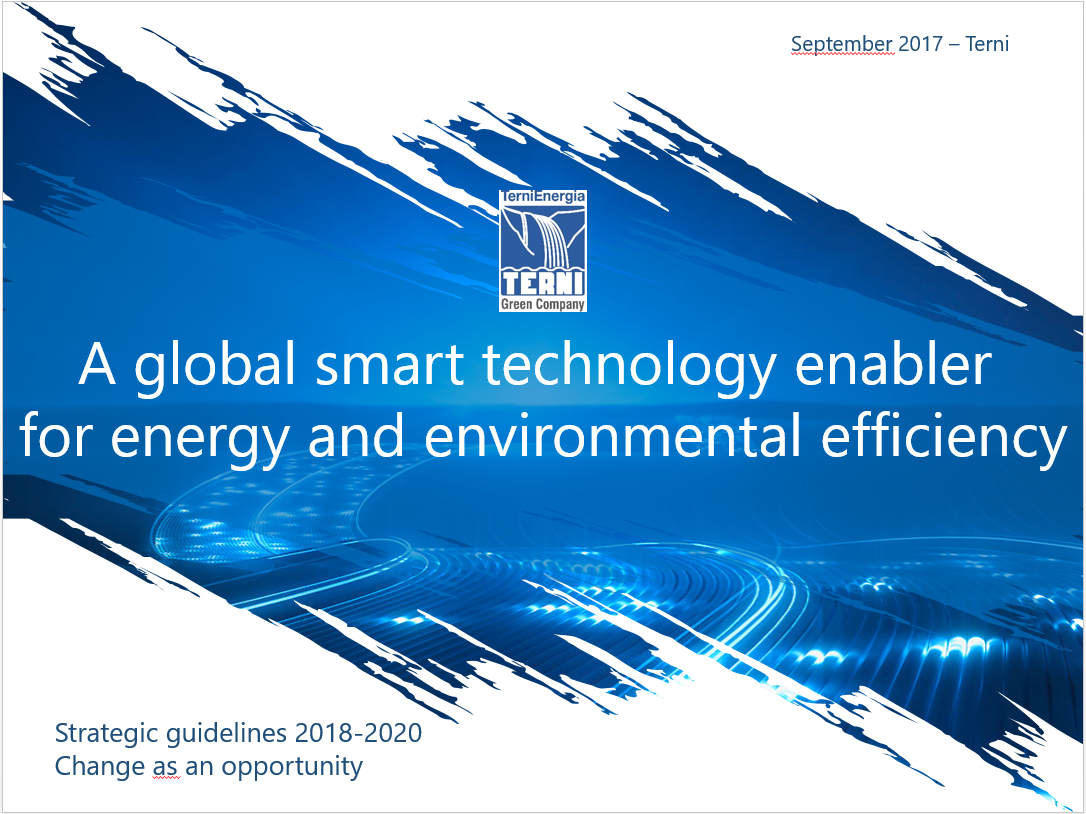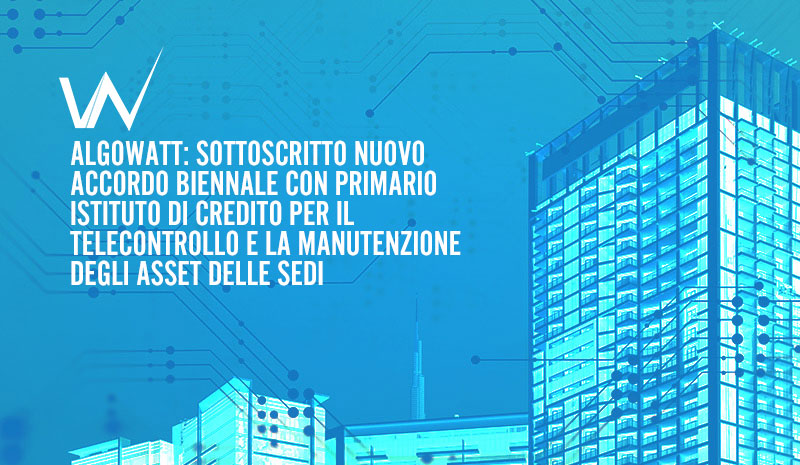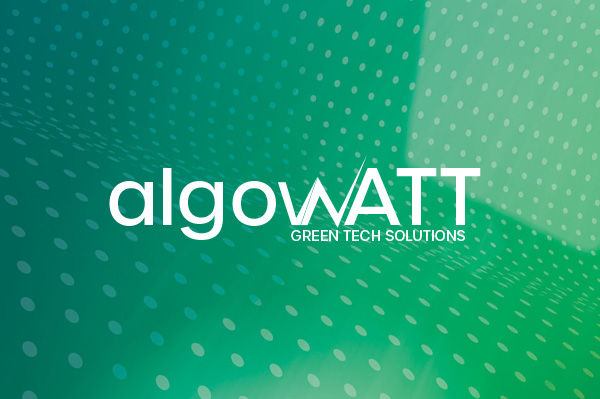• THE PLAN AIMS TO DEFINE THE GROUP’S NEW IDENTITY AS A “GLOBAL SMART TECHNOLOGY ENABLER” FOR ENERGY AND ENVIRONMENTAL EFFICIENCY
• REVENUES FOR CIRCA 226 MILLION EUROS AND EBITDA MARGIN OF 16% IN 2020
• FOCUS ON DIGITAL TRASFORMATION, GRID BALANCING AND DEMAND RESPONSE MARKET ENTRY, SMART MICROGRID DEVELOPMENT, THE RELAUNCH OF ACTIVITIES IN ENERGY TRADING, THE DEVELOPMENT OF THE SMART MOBILITY SECTOR, EXPONENTIAL GROWTH IN SERVICE ACTIVITIES, DEBT REDUCTION, BALANCE SHEET REINFORCEMENT AND EFFICIENCY IN THE MANAGEMENT OF FIXED COSTS
• DELEGATED POWERS TO THE VICE PRESIDENT MR. GIULIO GALLAZZI AND TO THE EXECUTIVE DIRECTOR MS. LAURA BIZZARRI
• MAIN PLAN OBJECTIVES:
o EXPECTED REVENUES IN 2020: CIRCA 226 MILLION EUROS, WITH REPOSITIONING IN THE “SMART SOLUTIONS AND SERVICES” SECTOR BEING CRUCIAL IN CONTRIBUTING TO REVENUES
o EXPECTED EBITDA MARGIN: 16% IN 2020
o EXPECTED EBIT IN 2020: CIRCA 26 MILLION EUROS
o FURTHER SEMPLIFICATION OF THE GROUP’S ORGANISATIONAL STRUCTURE TO INCREASE VALUE CREATION
o TRANSITIONAL PHASE FOR THE COMPLETION OF THE UTILITY SCALE PHOTOVOLTAIC PROJECTS IN TUNISIA AND ZAMBIA
The Board of Directors of TerniEnergia, the smart energy company which is part of Italeaf Group and is listed on the Star segment of Borsa Italiana, has approved the guidelines of the new strategic three year plan for the 2018-2020 period.
The Vice President Mr Giulio Gallazzi, with powers for the financial aspects and the formulation of proposal for extraordinary transactions, stated:
“The approved Plan is based on criteria of credibility and prudence, with regard to industrial and economic-financial aspects. The Board of Directors decided to proceed with a prudent and rational management of the transition, despite the fact that significant strategic changes have been planned and started towards a company with an increasingly higher technological content. The guidelines outlined above highlight clear and high potential prospects, which have already led to the identification of important development opportunities in Italy and abroad”.
*****
The plan is focused on the Group’s strategic repositioning, which thanks to the integration of digital companies Softeco Sismat and Selesoft, will complete the transformation from leader in the photovoltaic sector to smart energy company acting as a “technology enabler” for the efficient use of energy and resources.
The main objective of the plan is to reposition the Group towards providing services and solutions with greater added value and high technology content. Such activities allow for resource efficiency by developing and implementing solutions in the fields of power generation, energy saving, energy trading and sustainable mobility. Further to this the Group will continue to innovate and develop activities in renewable energy asset management as well as in energy efficiency and resource recovery in the environmental and cleantech sectors. There is therefore a clear prevalence of activities related to services and solutions with a high technological content over the activities that have characterised the Group in the past.
The strategic guidelines were drawn up before the natural expiry of the previous business plan, as a result of the acceleration of the transformation process of the core-business. This led to significant non-recurring writedowns, mainly related to international projects in the photovoltaic EPC sector, which affected the results of the half-year financial statements.
Expected growth is supported by an exponential increase in service activities (Consulting, Solutions, Management, On-site engineering and operations, Smart trading), including the relaunch of energy trading, which will account for over 90% of total revenues in 2020 (the consolidated revenues target for 2020 is circa 226 million euros) as well as for 75% of Ebitda in the next three years (Ebitda target in 2020 is circa 35 million euros, with Ebitda margin above 16%).
Foreseen Ebitda growth will be achieved thanks to the quality of the client portfolio and the consequent increase in turnover.
In terms of Ebit, the objective is to reach circa 26 million euros by 2020.
Forecasts were made considering medium and long term macroeconomic scenarios, the evolution of the energy sector and the expected digitalisation of electricity services and sustainable mobility. Activities will therefore principally be focused on emerging sectors which have high growth potential due to digital transformation and high demand for dedicated technologies. In view of this the following objectives have been set:
- grid balancing and demand response (consumer and supply-side aggregator) market entry;
- development of smart microgrids;
- relaunch of energy trading activities;
- development of the smart mobility sector;
- significant increase in service and consultancy activities with high technology content.
Objectives will be reached also by reducing the impact of both general costs and capital intensive investments on turnover. Cost efficiencies will continue to be pursued through activities which aim to improve internal processes in relation to working capital, procurement, human resources and plant management.
The first step towards the semplification of Group structure, operational efficiency and reduced complexity is a reduction of the number of SBUs (Strategic Business Units) from four to two: (1) Assets (which includes power generation activities and the management of environmental sector plants for resource recovery and recycling) and (2) Smart Solutions and Services (organised according the the following LOBs: Consulting, Solutions, Management, On-site engineering and operations, Smart trading).
The Board of Directors has delegated to the Vice President, Mr. Giulio Gallazzi the power to take care of the financial matters and formulate proposals for extraordinary transactions relating to them. The powers of the Executive Director, Laura Bizzarri, have also been extended with the conferral of ordinary administration powers with a limit of Euro 2 million per transaction.
These measures, together with further actions such as the withdrawal – as per the decision of the Board of Directors – of the collective layoffs announced in August, the definition of a personnel management plan supported by the “Cassa Integrazione straordinaria” redundancy fund and the completion of the utility scale photovoltaic plants in Tunisia and Zambia, will give greater flexibility to the Group and a more rationalised allocation of costs, therefore adding value to the project backlog. Expansion of the Group’s presence in Milan is also planned in order to improve access to the growing worldwide market for smart technologies.
Central to the new plan will be maintaining a solid financial structure in order to improve the net financial position and reduce financial expenses. TerniEnergia has begun a deleveraging process in order to strengthen its balance sheet. This process, which has the objective of guaranteeing the financial resources necessary to support development over the next three years, may involve current shareholders as well as potential investors and/or industrial partners.








